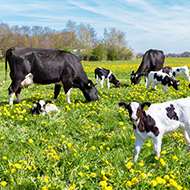Study to aid selective breeding in cattle

"If we can map which DNA regions directly impact gene activity, we can determine which genetic changes are most likely driving the observed changes in key traits" - Dr James Prendergast.
Researchers at the University of Edinburgh's Roslin Institute are developing a method of identifying specific letters in the DNA code of cattle that govern the development of key physical traits, including productivity or tolerance to disease.
A high-resolution approach will be taken to precisely identify sections within the DNA code that behave like switches to directly control gene activity. Known as regulatory elements, these switches govern whether an animal will exhibit the characteristics associated with a particular gene.
Lan and computer-based methods will be applied simultaneously to test the impact of millions of genetic changes on gene activity in the two main sub-species of cattle, which will help to generate a map of key DNA changes linked to gene activity.
The researchers hope to identify the specific DNA changes underlying important welfare and production traits in cattle, by intersecting these variants with regions known to control important cattle characteristics.
Dr James Prendergast, from the institute's Centre for Tropical Livestock Genetics and Health, said: “We know the regions of DNA responsible for many production and disease characteristics in livestock, but not the precise genes and DNA changes involved.
“This is a major barrier to improving production traits through breeding and genome editing. If we can map which DNA regions directly impact gene activity, we can determine which genetic changes are most likely driving the observed changes in key traits.
“We hope this will substantially improve the rate at which we can improve important characteristics in livestock.”
The insights from the study are hoped to assist the use of gene-editing technology targeting regulatory variants to give rise to preferred traits in livestock.
Funded by a Biotechnology and Biological Sciences Research Council award of almost £750,000, the project features technology from Annogen – Survey of Regulatory Elements (SuRE) – which improves on low resolution techniques that spot only the broad regions of DNA in which these regulatory variants reside.
Annogen's CEO, Dr Joris van Arensbergen, commented: `'In this project our SuRE technology will help identify genomic regions that control gene activity while at the same time screening millions of genetic changes to identify the most likely high-impact ones.
“Normally our clients are pharma and plant breeding companies, so we are very excited to be working with the experts at Roslin to apply our technology in livestock research for the first time.”



 The Veterinary Medicines Directorate (VMD) is inviting applications from veterinary students to attend a one-week extramural studies (EMS) placement in July 2026.
The Veterinary Medicines Directorate (VMD) is inviting applications from veterinary students to attend a one-week extramural studies (EMS) placement in July 2026.